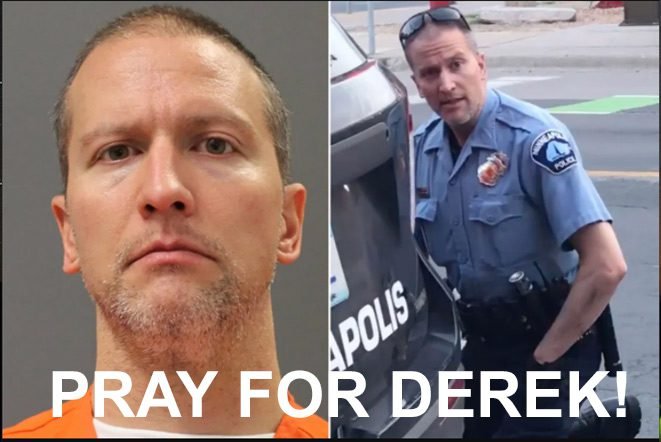
Guest post by MJ Lisbeth
I am praying for Derek Chauvin.
I overheard that pronouncement yesterday. Had I been inclined to butt into the conversation of the person who made it, I would have asked, “What, exactly, are you praying for?”
What Derek Chauvin did to George Floyd is murder. It can’t be called anything else. Though Floyd had been arrested and served jail (not prison) time before his fatal encounter with now-former officer Chauvin, he was not, as Candace Owens and others claimed, a “violent criminal.” Even if he’d fit Owens’ label, how would Chauvin have known as much unless he did a background check on him? And, even if he were as much a menace to society as Owens tried to paint him, it wouldn’t have warranted Chauvin planting his knee into Floyd’s neck. Former police department colleagues and supervisors said as much in their testimonies.
So, I think it’s fair to say that, like anyone else who was murdered, George Floyd died unjustly. Therefore, I believe, justice is not possible, even if it were possible to return Floyd to his place among the living. (That, by the way, is one reason I have opposed capital punishment for as long as I’ve known what it is.) While Derek Chauvin will be punished, as I believe he should be, nothing that can be extracted from him—time, money, even his life itself—can compensate for what he took from George Floyd.
I would assume that anyone who would pray for Derek Chauvin, or anyone else, believes that the God to which they pray is at least just, and possibly merciful. Given what I’ve said before, I can’t understand how a just God would allow George Floyd to die as he did. Although I don’t think an unjust being can also be merciful, I imagine that some people who are praying might want mercy on Derek Chauvin. They’d trot out a seemingly all-purpose Bible verse like John 3:16 or, if they’ve actually read the Book, something like Matthew 5:7 or 7:12—or James 2:13. The problem is, of course, that it appealing to God for mercy on Chauvin turns him into the victim, or at least the person in need of succor.
This is the problem with the Christian notion of forgiveness–which, I would guess, some people would ask for Chauvin in their prayers. Some have had the audacity and arrogance to say that Floyd’s family should “forgive” Chauvin and “move on.” How anyone can see a murderer—especially one who has been entrusted by his community and country with the power of life and death over another human being and, more important, with the trust that he will use that power rarely, judiciously and with the utmost restraint—as a victim in need of “forgiveness” is beyond me. (I say that as a long-ago Army Reservist who, thankfully, never exercised lethal force, except against a rattlesnake.) And who has the right to tell Floyd’s family how they should deal with their loss? If they choose to “forgive” Chauvin, whatever that means to them, that should be their decision alone.
In brief, although I don’t know what someone might pray for when praying for Derek Chauvin, I can only conclude it most likely has to do with making it easier for him to bear his guilt, and not to ease the pain of George Floyd’s family and loved ones, let alone to afford his life the meaning it had and thus to truly acknowledge the tragedy and horror his death really is.
So why didn’t I butt into the conversation of that stranger who offered a prayer for Derek Chauvin? For one thing, I’m a New Yorker, and we have a reputation for minding our business, or at least pretending to. For another, asking what the stranger meant by that comment would have been pointless, really: If that person’s God were truly merciful and forgiving, Chauvin wouldn’t have murdered George Floyd, whether or not he was aware of Floyd’s mostly-petty crimes—which, of course negates the need to pray for mercy or forgiveness, or anything else. Oh, and I have long since stopped believing in that person’s God, or any other, especially one who allows such injustices as Derek Chauvin using the power entrusted to him to murder George Floyd.
Bruce Gerencser, 66, lives in rural Northwest Ohio with his wife of 45 years. He and his wife have six grown children and thirteen grandchildren. Bruce pastored Evangelical churches for twenty-five years in Ohio, Texas, and Michigan. Bruce left the ministry in 2005, and in 2008 he left Christianity. Bruce is now a humanist and an atheist.
Connect with me on social media:
Your comments are welcome and appreciated. All first-time comments are moderated. Please read the commenting rules before commenting.
You can email Bruce via the Contact Form.
